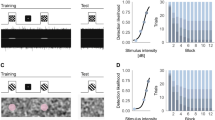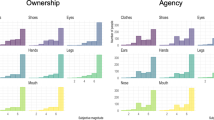Abstract
WHY is it that most people cannot tickle themselves? Darwin observed that “from the fact that a child can hardly tickle itself, or in a much less degree than when tickled by another person, it seems that the precise point to be touched must not be known”1. (There may be differences between man and other primates. The Kelloggs observed that their chimpanzee Gua was “frequently observed in the process of tickling herself and laughing as a result”2.) But this hypothesis seems prima facie incorrect, or at least inadequate, as most children can be tickled even when they know where and when the tickle stimulus is to be applied. No experimental work appears to have been reported on this question, and Darwin's interest was primarily centred on the biological value of ticklishness and laughter. The problem is perhaps not trivial; evidently knowledge of some sort is necessary for the cancellation of the ticklish sensation, and it has been shown that cancellation of other signals (for example, those that arise from voluntary movement of the eyes) seems to be produced by self-generated “command” signals rather than by external feed-back3,4. Does a similar mechanism exist for the tactile system ? Another question is whether pain is subject to the same type of control; if so, there could be practical clinical applications.
This is a preview of subscription content, access via your institution
Access options
Subscribe to this journal
Receive 51 print issues and online access
$199.00 per year
only $3.90 per issue
Buy this article
- Purchase on Springer Link
- Instant access to full article PDF
Prices may be subject to local taxes which are calculated during checkout
Similar content being viewed by others
References
Darwin, C., Expression of the Emotions in Man and Animals, 201 (John Murray, 1872).
Kellogg, W. N., and Kellogg, L. A., The Ape and the Child, 115 (McGraw Hill, New York, 1933).
von Holst, E., Brit. J. Anim. Behav., 2, 89 (1954).
Gregory, R. L., Eye and Brain, 90 (World University Library, 1966).
Stengel, E., Brit. J. Psychiat., 3, 795 (1965).
Author information
Authors and Affiliations
Rights and permissions
About this article
Cite this article
WEISKRANTZ, L., ELLIOTT, J. & DARLINGTON, C. Preliminary Observations on Tickling Oneself. Nature 230, 598–599 (1971). https://doi.org/10.1038/230598a0
Received:
Issue Date:
DOI: https://doi.org/10.1038/230598a0
This article is cited by
-
Emerging principles in functional representations of touch
Nature Reviews Psychology (2023)
-
Neuroscience robotics for controlled induction and real-time assessment of hallucinations
Nature Protocols (2022)
-
The positive dimension of schizotypy is associated with a reduced attenuation and precision of self-generated touch
Schizophrenia (2022)
-
Emergence of sensory attenuation based upon the free-energy principle
Scientific Reports (2022)
-
The Illusion of Agency in Human–Computer Interaction
Neuroethics (2022)
Comments
By submitting a comment you agree to abide by our Terms and Community Guidelines. If you find something abusive or that does not comply with our terms or guidelines please flag it as inappropriate.



